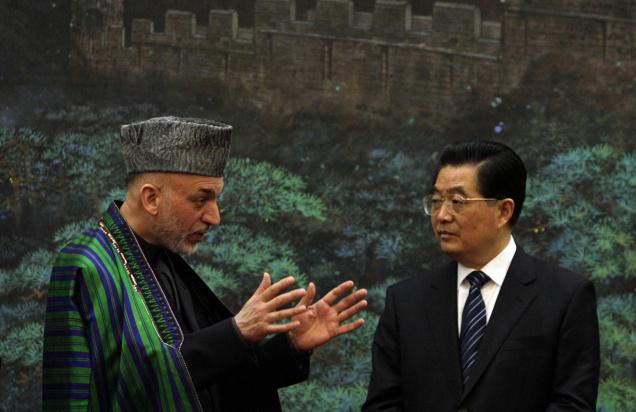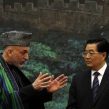
The Economic Underpinnings of China’s Regional Security Strategy in Afghanistan
Publication: Eurasia Daily Monitor Volume: 7 Issue: 75
By:

Cooperation between China and Afghanistan has not been consistent since the two countries established diplomatic relations in 1955. However, following 9/11, their economic and security cooperation has continued to develop. On March 24, Presidents, Hamid Karzai and Hu Jintao, signed yet another package of economic agreements to facilitate trade and investment, while agreeing to enhance regional security and trilateral cooperation with Pakistan (www.afghanistan.ru, March 24; Kommersant, March 26). Yet, military collaboration remains limited between the two states, with China basing its regional security strategy predominantly on its economic expansion.
Afghanistan increasingly relies on Chinese investments to promote its economic development. China, in turn, views Afghanistan as a source for raw materials and an important energy, transportation, and trade link that can enhance Beijing’s regional security interests. Not fully disclosed, the March 24 accords reportedly seek to promote Afghan exports, and increase China’s investments in the country’s hydroelectric, mining, railway, construction, and energy projects. As part of the deal, Beijing is also planning to provide a grant worth 160 million yuan ($23.4 million) to Afghanistan (Xinhua, March 26; www.fergana.ru, March 26; www.afghanistan.ru, March 24). The agreements, and Karzai’s expanding ties with Beijing, might help him not only attract much needed investment and improve security, but also partially tone down the mounting criticism of his rule.
The statements on the need to enhance regional security that accompanied the economic agreements point to the growing significance of bilateral economic cooperation in China’s regional security strategy. “Both sides should … actively strike at terrorism, separatism and religious extremism and organized cross-border crimes in an effort to maintain regional peace and stability,” Hu stated. Karzai, underlined that “Afghanistan is willing to cooperate with China and other countries in the region in advancing peace and stability… Afghanistan is honored to have a friend and neighbor like China” (Xinhua, March 24).
China is now the largest investor in the Afghan economy. Its Metallurgical Group Corporation outbid companies in Kazakhstan, Russia, Canada, and the US in 2007 with a proposal to invest $3.5 billion in Afghanistan’s Aynak copper mine –one of the largest in the world. The company aims to provide jobs for 10,000 Afghans, build a power station and roads, and is expected to contribute $400 million in tax revenues to the Afghan government annually (Interfax, December 30, 2009).
Afghanistan has an estimated 1.6 billion barrels of oil and 440 billion cubic meters (bcm) of gas, deposits of ferrous and non-ferrous metals, iron ore and gold. The Chinese were so interested and active in the country’s extractive sector that Bamian province officials noted the frequency of visits by Chinese delegations to the area. A western diplomat in Afghanistan was further prompted to state that “…only China can be the single most serious investor in the country…” (Kommersant, March 26).
The officially reported bilateral trade level reached $155 million in 2008 and is set to expand in light of the recent agreements. Beijing has also provided Afghanistan with $130 million in reconstruction aid since 2002, promising $75 million in the next five years to improve local conditions. It further abolished tariffs on 278 Afghan export items in 2006. Chinese contractor companies have additionally been involved in infrastructure work funded by Western sources throughout Afghanistan (www.fergana.ru, March 26).
Beijing is clearly focusing on economic, rather than military, engagement to bolster long-term security in Afghanistan and the region. It has trained 1,000 Afghan specialists in various fields, provided training and equipment to the Afghan army, and assisted with counterterrorism and counternarcotics activities (www.fmprc.gov, March 27, 2009). Nonetheless, China has not set up regional military bases or deployed forces in Afghanistan despite its extensive peacekeeping experience. Nor has it chosen to work closely with NATO, the activities of which it treats with caution (China Daily, March 25). Beijing’s related disinterest stems from its concerns about instability in its Muslim and restive Xinjiang Province that could result from expanded military involvement in Afghanistan. China also concentrates on building up its regional and global economic capabilities, choosing not to entangle itself in potentially exhausting military missions. It can thus “pick up the fruits” while others “are doing the heavy lifting” in Afghanistan, and also lay the foundation for long-term security in the region through economic development (Interfax, December 30, 2009).
China’s economic expansion in Afghanistan, therefore, appears to be a key element of its security strategy, especially as far as its relations with Central Asia, South Asia, and the Middle East are concerned. All three regions present challenges and opportunities for Beijing, with Afghanistan and Pakistan being key transportation and trade links extending from Iran to China. Beijing has already constructed a port at Gwadar in Pakistan, a partner in countering India’s ambitions, allowing it to import 60 percent of its energy needs from the Middle East. China now plans to connect the port with Xinjiang through Afghanistan to secure a more efficient delivery of energy resources to fuel its booming economy. Given that the overall lack of transportation networks complicates Beijing’s economic expansion, China is well positioned to benefit from its expanded cooperation with Afghanistan (www.afghanistan.ru, March 23; www.centrasia.ru, March 5, 2009). This, however, will place an additional burden on China to manage India-Pakistani rivalries, including those centered on Afghanistan.
China feels no imperative at this stage to promote regional security by substantially expanding its military presence in Afghanistan. Its growing economic capabilities in the context of NATO’s military involvement currently enables it to promote regional economic and security interests without committing itself militarily. However, the planned withdrawal of the coalition forces from Afghanistan by 2011, and Beijing’s own rising regional influence might soon translate into a more pronounced military-based regional security strategy.




